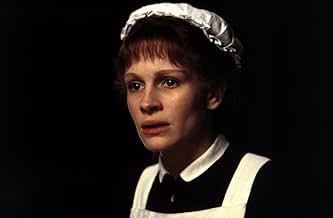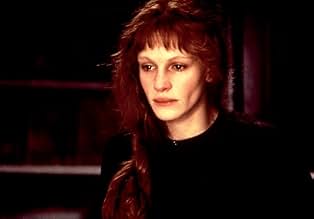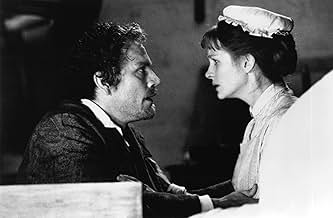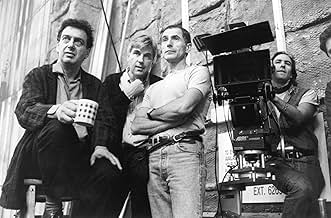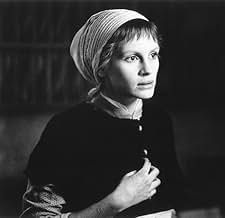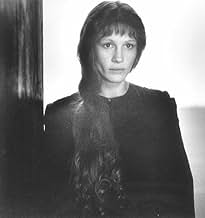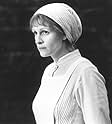NOTE IMDb
5,8/10
16 k
MA NOTE
Une femme de chambre tombe amoureuse du Dr Henry Jekyll et de M. Edward Hyde, son homologue sombre et mystérieux.Une femme de chambre tombe amoureuse du Dr Henry Jekyll et de M. Edward Hyde, son homologue sombre et mystérieux.Une femme de chambre tombe amoureuse du Dr Henry Jekyll et de M. Edward Hyde, son homologue sombre et mystérieux.
- Réalisation
- Scénario
- Casting principal
- Récompenses
- 6 nominations au total
Ciarán Hinds
- Sir Danvers Carew
- (as Ciaran Hinds)
Avis à la une
Initially, I stayed away from this movie as it received merciless reviews. The fact that Julia Roberts was in it also was another obstacle. Yet as other reviewers have mentioned, she actually gives a good performance. John Malkovich is excellent as the tormented Jekyll/Hyde character.
The cinematography and moods are haunting. One feels they are actually re-living the Victorian era, where the servants woke up at 4AM to complete their drudgery. The kitchen conjures up the stark realities of survival, the eel that is chopped up for dinner (while alive) Mary Reilly turns white as a sheet as she sees the animal die. I actually began to appreciate Ms. Roberts' performances more after this film (also in films like "Mona Lisa Smile", she projects a certain believability; is not just a physical presence). At one point, there is a most effective scene wherein Roberts must see to her mother's burial, and goes to the tenement to make arrangements. The landlord has placed her mother's body in a damp cellar closet, saying she is "most comfortable" as he hands her one shilling, the only money Roberts will inherit. Roberts then says; ..."ä poor wage for a lifetime of drudgery"... We are reminded of the workhouses of Dickens, and the rigid class structures which she must survive...
While the dialect is at times choppy, she is believable as an Irish maid; and the supporting cast also lends credence to this story. Malkovich varies his performance between Jekyll/Hyde, and it is effective and visceral.
If you initially avoided this film, I would highly recommend seeing it now. The atmosphere and music are haunting and sad. 9/10
The cinematography and moods are haunting. One feels they are actually re-living the Victorian era, where the servants woke up at 4AM to complete their drudgery. The kitchen conjures up the stark realities of survival, the eel that is chopped up for dinner (while alive) Mary Reilly turns white as a sheet as she sees the animal die. I actually began to appreciate Ms. Roberts' performances more after this film (also in films like "Mona Lisa Smile", she projects a certain believability; is not just a physical presence). At one point, there is a most effective scene wherein Roberts must see to her mother's burial, and goes to the tenement to make arrangements. The landlord has placed her mother's body in a damp cellar closet, saying she is "most comfortable" as he hands her one shilling, the only money Roberts will inherit. Roberts then says; ..."ä poor wage for a lifetime of drudgery"... We are reminded of the workhouses of Dickens, and the rigid class structures which she must survive...
While the dialect is at times choppy, she is believable as an Irish maid; and the supporting cast also lends credence to this story. Malkovich varies his performance between Jekyll/Hyde, and it is effective and visceral.
If you initially avoided this film, I would highly recommend seeing it now. The atmosphere and music are haunting and sad. 9/10
This has to be one of the most maligned films of the past couple of years; it's virtually shoved under the carpet every time Julia Robert's career is mentioned and it's generally dismissed as a bore. And in a lot of ways, it IS boring; not a lot happens during the course of the plot and as a horror film it utterly fails to provide a sense of urgency and fright in the conventional sense.
It's also one of the most elaborate, mysterious and beautifully conceived big-budget fantasies committed to film. The fact of its plodding storyline is, in a sense, besides the point of its true merit; that it is a dark, intensely brooding look at a woman's damaged sexuality and psyche and the oppressive times in which she existed. The original Valerie Martin book ingeniously transmogrified the Robert Louis Stevenson story into an examination of a lost female soul who finds her redemption in a fog-shrouded hell. Stephen Frear's film is in every respect a successful mood piece, a meditation on an individual's dark journey into not just a world of physical violence but her own crippled sense of selfhood and history of abuse. More than most other contemporary films about the Victorian era, this film captures in meticulous and visceral detail the horrors of the Industrial Age---the poverty, the pollution-ridden streets filled with animal gore and filth, and the era's preoccupation/repulsion of the human body and the ominous glare of scientific knowledge gone awry in a society ill-prepared to meet the consequences. The cinematography and production design (by the great Stuart Craig) are breathtaking. A swinging door, partially obscuring the surgically opened corpse on a table...Mary making her way through the streets of the market, surrounded by animal viscera...the shock of a roomful of a prostitute's remains, savagely gutted by a demonic hand...rats in the sewer, swarming into the crevices of Mary's mind...the Doctor's operating theater, like a coliseum of depravity...Mary, lost in the fog.
These images were indelible to me and entertained my consciousness far more than any typical horror film could hope to. Julia Roberts, for all her trouble with the Irish accent and going against her image as "America's sweetheart", is the very picture of a haunted and ravaged soul, nearly destroyed by the abuse and poverty of her childhood and bewildered by the mysterious machinations of her homicidal employer. She lends a great deal of vulnerability and conviction to her role and carries the film in ways beyond dialogue and posturing. Not once does she flash her trademark million-dollar smile but what she gives to the film is far more valuable than glitz and in her looks and inflections reveals more on-screen than most of her other films combined.
This film won't appeal to most people. And admittedly, it does fail in so many ways that a lot of audiences will be turned off. A lot of people will definitely be bored to tears by the slow pace and "what the H*ll is happening?!?!?" quality of the narrative. But for viewers who liked Cocteau's "Beauty and the Beast", Neil Jordan's "Comany of Wolves" Caleb Carr's book "The Alienist" or perhaps Ken Russell's "Gothic", this is worth a try. It should not be written off as just another big-budget Hollywood failure, because its aims, whether conscious or not, are quite different from your average thriller or period film. Approach it with an open mind, be prepared for a dark and disconcerting vision, and you might be rewarded because this film is unique, baroque, different and great.
It's also one of the most elaborate, mysterious and beautifully conceived big-budget fantasies committed to film. The fact of its plodding storyline is, in a sense, besides the point of its true merit; that it is a dark, intensely brooding look at a woman's damaged sexuality and psyche and the oppressive times in which she existed. The original Valerie Martin book ingeniously transmogrified the Robert Louis Stevenson story into an examination of a lost female soul who finds her redemption in a fog-shrouded hell. Stephen Frear's film is in every respect a successful mood piece, a meditation on an individual's dark journey into not just a world of physical violence but her own crippled sense of selfhood and history of abuse. More than most other contemporary films about the Victorian era, this film captures in meticulous and visceral detail the horrors of the Industrial Age---the poverty, the pollution-ridden streets filled with animal gore and filth, and the era's preoccupation/repulsion of the human body and the ominous glare of scientific knowledge gone awry in a society ill-prepared to meet the consequences. The cinematography and production design (by the great Stuart Craig) are breathtaking. A swinging door, partially obscuring the surgically opened corpse on a table...Mary making her way through the streets of the market, surrounded by animal viscera...the shock of a roomful of a prostitute's remains, savagely gutted by a demonic hand...rats in the sewer, swarming into the crevices of Mary's mind...the Doctor's operating theater, like a coliseum of depravity...Mary, lost in the fog.
These images were indelible to me and entertained my consciousness far more than any typical horror film could hope to. Julia Roberts, for all her trouble with the Irish accent and going against her image as "America's sweetheart", is the very picture of a haunted and ravaged soul, nearly destroyed by the abuse and poverty of her childhood and bewildered by the mysterious machinations of her homicidal employer. She lends a great deal of vulnerability and conviction to her role and carries the film in ways beyond dialogue and posturing. Not once does she flash her trademark million-dollar smile but what she gives to the film is far more valuable than glitz and in her looks and inflections reveals more on-screen than most of her other films combined.
This film won't appeal to most people. And admittedly, it does fail in so many ways that a lot of audiences will be turned off. A lot of people will definitely be bored to tears by the slow pace and "what the H*ll is happening?!?!?" quality of the narrative. But for viewers who liked Cocteau's "Beauty and the Beast", Neil Jordan's "Comany of Wolves" Caleb Carr's book "The Alienist" or perhaps Ken Russell's "Gothic", this is worth a try. It should not be written off as just another big-budget Hollywood failure, because its aims, whether conscious or not, are quite different from your average thriller or period film. Approach it with an open mind, be prepared for a dark and disconcerting vision, and you might be rewarded because this film is unique, baroque, different and great.
A housemaid (Julia Roberts) falls in love with Dr. Jekyll (John Malkovich) and his darkly mysterious counterpart, Mr. Hyde (John Malkovich).
Stephen Frears, an excellent director, cast two very big names and put them in a twist of the Jekyll and Hyde story. This is not a horror tale, and the violence and gore are kept to a minimum. In some sense it is a love story, but only in the most general of terms. More accurately, it is a woman who is loyal to her employer.
The strangest thing about this is how little they tried to make the two halves look different. When Hyde comes out, he is still obviously Malkovich. How can they not notice? Someone remarks that they bear a resemblance, but it is much more than that.
Stephen Frears, an excellent director, cast two very big names and put them in a twist of the Jekyll and Hyde story. This is not a horror tale, and the violence and gore are kept to a minimum. In some sense it is a love story, but only in the most general of terms. More accurately, it is a woman who is loyal to her employer.
The strangest thing about this is how little they tried to make the two halves look different. When Hyde comes out, he is still obviously Malkovich. How can they not notice? Someone remarks that they bear a resemblance, but it is much more than that.
Mary Reilly is a great film to watch on a rainy afternoon. Often criticized as boring and a low point in Julia Roberts career, I found it to be a great Gothic story. While I can understand and see why people were put to sleep by the film, I think it's a refreshing change of pace from the standard popcorn flick that is only interested in being the number 1 film at the box office Monday morning. John Malkovich turns in a great performance of the Jekyll/Hyde character, and Glenn Close steals the few scenes she's in as a Madame of a brothel. Julia Roberts plays against type as a dour chambermaid, and I think that's what put off so many people. Obviously, most people like their Julia flashing her now $20 million dollar smile. I say, "good for you for trying something different." If you haven't seen Mary Reilly, watch it on the next rainy day and enjoy it.
My grade: 8 out of 10
My grade: 8 out of 10
I am glad to see a few other reviewers calling this "underrated." I figured I was the only person who actually liked this film. All the national critics sure hated this low-key re-telling of Jekyll and Hyde.
The muted colors with the grey overtones caught my eye and were very interesting to observe. Julia Roberts also was interesting to watch: no makeup, no smile, just sad, somber looks yet still appealing. Despite critics' comments to contrary, I found this an intelligent adaption of the famous story.
People don't care for subtly in films anymore. They want in-your-face smash- ups, gore, violent contrasts....and a lot of it. This movie is extremely low-key and subtle, although there are some bloody scenes.
I have to admit that I agree with one criticism, that it's hard to believe Roberts' character "Mary Reilly" would not recognize Jekyll from Hyde (played by John Malkovich) when he didn't change facial appearances! And, yes, the film, generally- speaking, is a real downer, a depressing tale.
Yet, for some odd reason, despite the above paragraph, I recommend the film to people who enjoy slower films and subtle suspense, even if they have to suspend a little believability. I thought it was oddly fascinating.
The muted colors with the grey overtones caught my eye and were very interesting to observe. Julia Roberts also was interesting to watch: no makeup, no smile, just sad, somber looks yet still appealing. Despite critics' comments to contrary, I found this an intelligent adaption of the famous story.
People don't care for subtly in films anymore. They want in-your-face smash- ups, gore, violent contrasts....and a lot of it. This movie is extremely low-key and subtle, although there are some bloody scenes.
I have to admit that I agree with one criticism, that it's hard to believe Roberts' character "Mary Reilly" would not recognize Jekyll from Hyde (played by John Malkovich) when he didn't change facial appearances! And, yes, the film, generally- speaking, is a real downer, a depressing tale.
Yet, for some odd reason, despite the above paragraph, I recommend the film to people who enjoy slower films and subtle suspense, even if they have to suspend a little believability. I thought it was oddly fascinating.
Julia Roberts Through the Years
Julia Roberts Through the Years
Take a look back at Julia Roberts' movie career in photos.
Le saviez-vous
- AnecdotesTim Burton was originally set to direct this after he completed filming Ed Wood (1994), but subsequently dropped out of the production of "Mary Reilly" out of anger towards Peter Guber for putting "Ed Wood", a passion project, into turnaround.
- GaffesMary's accent disappears & reappears several times during the film.
- Citations
Mary Reilly: He said you have an illness. What kind of an illness?
Dr. Henry Jekyll: You might call it a fracture in my soul, something which left me with a taste for oblivion.
Meilleurs choix
Connectez-vous pour évaluer et suivre la liste de favoris afin de recevoir des recommandations personnalisées
Détails
- Date de sortie
- Pays d’origine
- Langue
- Aussi connu sous le nom de
- El secreto de Mary Reilly
- Lieux de tournage
- Sociétés de production
- Voir plus de crédits d'entreprise sur IMDbPro
Box-office
- Budget
- 47 000 000 $US (estimé)
- Montant brut aux États-Unis et au Canada
- 5 707 094 $US
- Week-end de sortie aux États-Unis et au Canada
- 2 812 620 $US
- 25 févr. 1996
- Montant brut mondial
- 12 379 402 $US
- Durée
- 1h 48min(108 min)
- Couleur
- Mixage
- Rapport de forme
- 1.85 : 1
Contribuer à cette page
Suggérer une modification ou ajouter du contenu manquant


